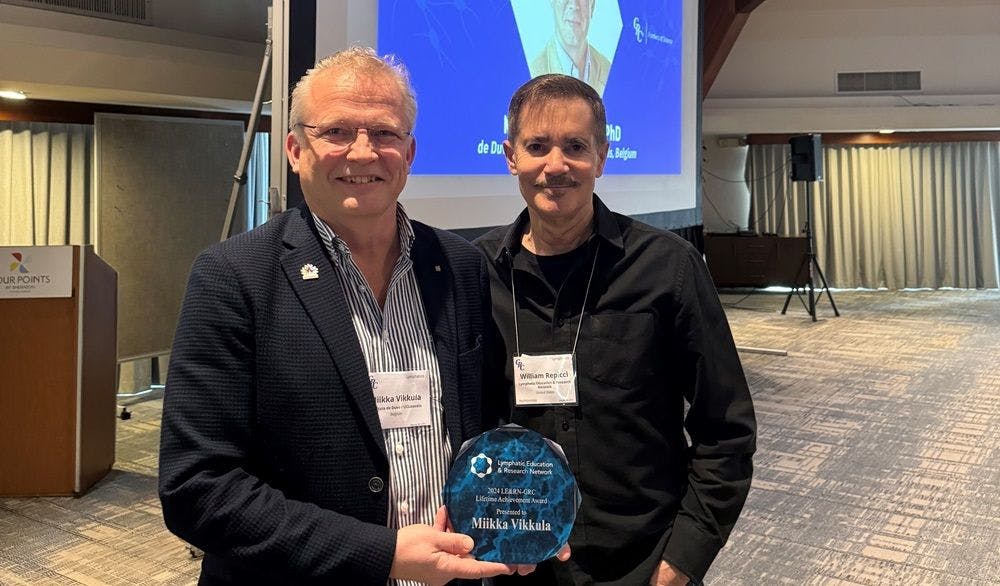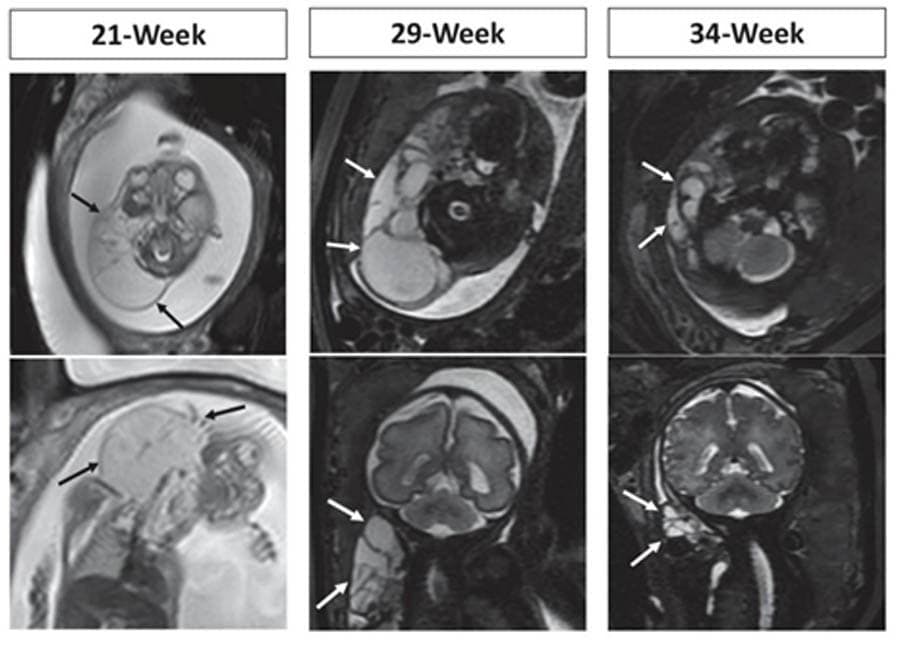

Miikka Vikkula
Institut de Duve Avenue Hippocrate 74 - B1.74.06 1200 Bruxelles
The Vikkula Lab studies the genetic variations underlying human diseases.
Achievements & Honors
- The triennial international Gagna and Van Heck Prize for incurable diseases (2024) (with Prof. L.M.Boon)
- The Gustav R. Born Honorary Award for Research in Angiology/Vascular Medicine from the independent European Society of Vascular Medicine/Angiology VAS (with Prof. L.M.Boon)
- Vice President of the International Society for the Study of Vascular Anomalies (ISSVA)(2024-2026)
- Lifetime Achievement Award by the Lymphatic Education & Research Network (LE&RN) at Gordon Research Conference on Lymphatics (2024)
- Earl P. Benditt Award of North American Vascular Biology Organization (NAVBO) (2023)
- European Co-ordinator of the Leducq Network of Excellence Recalibrating Mechanotransduction in Vascular Malformations (2022-2026)
- EU MSCA-ITN-2018, Co-ordinator of the VA Cure project (2019-2024)
- WELBIO, Walloon Excellence in Lifesciences and Biotechnology, Belgium (2011-2026)
- the First Generet Prize for the study of Rare Diseases (Fonds Roi Baudouin, Belgium) (2018-2022)
- Appearance on the Standford List of top 2% of scientists by citation metrics (doi: 10.17632/btchxktzyw.3) (2021)
- "Commandeur de l’Ordre de Léopold" (2018)
- Prix du Concours ordinaire de la 1ère Section (Sciences Biomédicales), Académie Royale de Médecine, Belgium (2016)
- Membre titulaire, Royal Academy of Medicine of Belgium, Brussels, (Belgium) (2016)
- INBEV-BAILLET LATOUR Clinical Research Award (with Prof. L. Boon) (2013)
- Lambertine-Lacroix, FNRS, Belgium (2010)
- Eugène de Sommer Scientific Award, University catholique de Louvain, Belgium (2006)
- Pfizer Scientific Award, Belgium (2006)
- 11th Manchester Birth Defects Conference, Manchester, UK. Keynote lecture: “Genetic causes of vascular malformations »(Nov 2004)
- 15th International Workshop on Vascular Anomalies, Wellington, New Zealand. Keynote Lecture: “Molecular Basis of Vascular Anomalies”. (Feb 2004 )
- The Society for Pediatric Dermatology Annual Meeting, Seattle, USA. Sidney Hurwitz keynote lecture: “Molecular genetics of vascular anomalies”. (June 2003)
- 14th International Workshop on Vascular Anomalies, Nijmegen, Holland. Keynote Lecture: “Towards understanding the ethiopathogenesis of vascular malformations”.(June 2002 )
- Pharmacia Scientific Award, Belgium (2002)
- Marie-Curie fellowship award of the European Union (1998-2000)
- HFSPO Long-Term Fellowship Award (2-years) (1997)
- Fogarty International Fellowship Award, NIH, USA (1994-1996)
Affiliations
- Professeur ordinaire (Full Professor), Human Geneticsat the Université catholique de Louvain, Health Science Sector and Faculty of Medicine, Brussels, Belgium
- Director, de Duve Institute
- Honorary Associate Professor, F.R.S.-FNRS
- Investigator, WELBIO Department, WEL Research Institute
Research
Question
Which DNA mutations predispose to or cause genetic diseases like vascular anomalies, lymphedema, cleft lip and palate, or cancer and how can we develop new therapies to target them?
Research focus
The overarching aim of our research is to discover the genetic variations that drive human disease, and to understand how and why they do so. We study a variety of developmental disorders of the cardiovascular and skeletal systems, as well as certain cancers. The molecular mechanisms of many are not known, and current treatments are therefore broad-based and aimed at alleviating symptoms. Identification of the primary causes as well as modulating factors would greatly facilitate the development of more effective, less caustic treatments. Towards this goal, our laboratory combines a large bio-bank of patient blood and tissue samples associated with extensive clinical data, with large-scale genotyping data generated using cutting-edge Next Generation Sequencing techniques and a state-of-the-art data analysis pipeline developed in-house. Gene-discovery is followed by the generation of cell and animal models in which disruption of the culprit gene is used to recapitulate features of the human disease. These models are then used to study the molecular and biological consequences of disease causative genetic changes, as well as to test potential therapeutic solutions. All of our research begins with samples obtained from patients, and we aim to go full circle: from bed to bench-side back to bed, providing patients with viable and tangible knowledge-based improvements in their health-care.
Ziekten
Bio
Dr Vikkula, MD PhD (1992-93 Helsinki Finland), a professor of genetics, became interested in vascular anomalies at Harvard Medical School 1993-97, and unravelled key concepts in their pathophysiology: genes, second-hits and decisively somatic mutations (2009). He is at the forefront of developing targeted therapies. He has received numerous honours such as the Inbev-Baillet Latour Clinical Prize and the 1st Generet Award (2019). He is a Member of the Royal Belgian Academy of Medicine since 2012.
With Prof LM Boon, Co-ordinator of the Vascular Anomaly Center (Brussels), the couple discovered the TIE2 gene for familial venous malformation (1996), and since many others, and made the pivotal demonstration that somatic mutations explain sporadically occurring vascular anomalies (2009). With collaborative efforts to generate the first ever animal model for venous malformation, and its proof of concept treatment with rapamycin, a small molecular inhibitor.
Clinical trials are now being conducted with various molecules in various countries. Prof Vikkula is well-known internationally as a major contributor to the understanding of molecular basis of vascular anomalies and lymphedema with >160 peer-reviewed publications, >50 reviews and chapters in major medical text books, and >24000 citations with an H-index of 78 (Google scholar).
Team
Clinical Investigator
Guest Investigator
Senior Investigators
Postdoctoral Scientists
PhD Students
Master Students
Research Assistants
Technical Support
Administrative Support
Loss-of-function mutations of the TIE1 receptor tyrosine kinase cause late-onset primary lymphedema
Brouillard P, Murtomäki A, Leppänen VM, Hyytiäinen M, Mestre S, Potier L, Boon LM, Revencu N, Greene AK, Anisimov A, Salo MH, Hinttala R, Eklund L, Quéré I, Alitalo K*, Vikkula M*
J Clin Invest (2024) 134(14):e173586
*equal contribution of these authors
Case report study of thalidomide therapy in 18 patients with severe arteriovenous malformations
Boon LM, Dekeuleneer V, Coulie J, Marot L, Bataille AC, Hammer F, Clapuyt P, Jeanjean A, Dompmartin A, Vikkula M
Nat Cardiovasc Res (2022) 1:562–567
Germline Loss-of-function Mutations in EPHB4 cause a Second Form of Capillary Malformation–Arteriovenous Malformation (CM-AVM2) deregulating RAS-MAPK signaling
Amyere M*, Revencu N*, Helaers R, Pairet E, Baselga E, Cordisco M, Chung W, Dubois J, Lacour JP, Martorell L, Mazereeuw-Hautier J, Pyeritz RE, Amor DJ, Bisdorff A, Blei F, Bombei H, Dompmartin A, Brooks D, Dupont J, González-Enseñat MA, Frieden I, Gérard M, Kvarnung M, Hanson-Kahn AK, Hudgins L, Léauté-Labrèze C, McCuaig C, Metry D, Parent P, Paul C, Petit F, Phan A, Quere I, Salhi A, Turner A, Vabres P, Vicente A, Wargon O, Watanabe S, Weibel L, Wilson A, Willing M, Mulliken JB, Boon LM, Vikkula M
Circulation (2017) 136(11):1037-1048
*equal contribution of these authors
Rapamycin improves TIE2-mutated venous malformation in murine model and human subjects
Boscolo E, Limaye N, Huang L, Kang KT, Soblet J, Uebelhoer M, Mendola A, Natynki M, Seront E, Dupont S, Hammer J, Legrand C, Brugnara C, Eklund L, Vikkula M*, Bischoff J*, Boon LM*
J Clin Invest (2015) 125(9):3491-504.
*equal contribution of these authors
Somatic mutations in the angiopoïetin-receptor TIE2 can cause both solitary and multiple sporadic venous malformations.
Limaye N*, Wouters V*, Uebelhoer M, Tuominen M, Wirkkala R, Mulliken JB, Eklund L, Boon LM, Vikkula M
Nat Genet (2009) 41(1):118- 124
*equal contribution of these authors




































